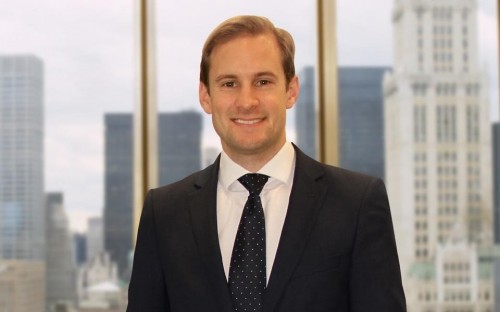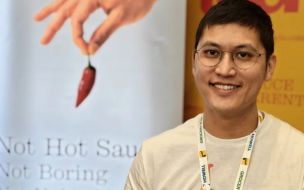Already selling at trade shows and by appointment, KUMETH coats — inspired by the traditions of ancient Inuit tribes of the Canadian Arctic — will be distributed to retailers in 2016. Sebastian is keen to make a social impact too: he wants to donate 20% of his sales profits to charity.
The Bavarian business pioneer started his career in sales at Deutsche Telecom, before a series of project-based consulting roles took him to Munich and London to work with heavyweights Microsoft, Intel, BMW and Bain.
He took up more long-term roles in branding at vehicle maker Man Truck & Bus AG — now owned by troubled car manufacturer Volkswagen — and in marketing for Porsche Design, before deciding to start his own business.
How did the idea to start your own luxury coat brand come about?
I just tried to solve a problem.
You can get a top designer coat for a lot of money, but even then the cuts are sometimes too wide and the buttons break and come loose. I thought that it must be possible to produce an amazing-quality coat for a price that is payable.
I read about the Inuit tribes, their culture and heritage, and I was fascinated to find out that they invented the parka-style coat centuries ago. Each coat was created with mutual collaboration between different families. It was a thing of hierarchy; the most beautiful coat belonged to the guy from the highest rank.
In the Inuit tradition of mutual support, we wanted to re-create high-quality, durable and functional coats with a contemporary twist.
What is the vision for your business?
It would be very arrogant to say that we’re going to be the new Crombie! We want to be different.
We want to establish KUMETH as an expert in creating beautiful coats, jackets and parkas. Then we would like to diversify into different collections so that we can dress an entire mannequin.
There is a big social impact criteria in our business strategy. The goal is to donate 20% of our sales profits directly to charity.
What challenges do you face?
Bringing a design that you have in your head together is a huge challenge.
You work with so many different stakeholders from different countries. Our buttons are made in Germany; our hang tags are from an Italian company. You’re always in contact with suppliers — for lining, fabric, hangers and labels — so there’s a lot of communication involved.
You also need to make people aware of your brand and build a social media presence. Bringing the brand out there demands a lot of investment.
What advice do you have for MBAs looking to start their own company?
Figure out if the entrepreneurial lifestyle makes you happy. You need to make sacrifices, work long hours and take big risks.
Entrepreneurs are problem solvers. You don’t have to come up with a new idea; just fix something or make it better. To save a lot of time, create a good network, talk to experienced people in the industry and get feedback.
How does the start-up culture in Germany compare to the UK’s?
In Germany it’s way smaller than in the UK. Germany has a very risk-averse business culture. We like to analyze and over analyze before we actually start something.
The process of establishing our form of limited company is also a real barrier. In the UK I set it up in literally 15 minutes and it cost me £25. In Germany you need a lawyer, and there’s so much paperwork and hassle that people don’t do it.
Why did you decide to pursue an MBA at Grenoble École de Management?
The London-Paris-Grenoble three-dimensional study scope was very interesting, and I wanted to deepen my knowledge of business and broaden my international network.
At Grenoble, we were in a group of 26 people from 21 different countries, all from a range of different backgrounds, from politicians and advisors to private sector financiers, entrepreneurs and consultants. I doubt that you get that from a standard master’s program!
How have you profited from the MBA?
It gave me the motivation to start a business. After an MBA you can either go into a job where it doesn’t really matter if you’re there tomorrow or not, or you actually change something and make an impact.
RECAPTHA :
e1
27
0a
ff








